Forms of Remembering
Some fragmented thoughts on quietness and the persistent garden, and a guest post from writer Katherine Ellis on the haunting of memory
Friday, July 18
Grand Rapids, Mich.
I’ve been feeling quiet lately. Maybe, after publishing Good Soil and talking so much on book tour, I don’t have many words left. Maybe, amidst everything that has been happening in this country (can you believe we’re just six months into this presidential administration?!?!?!) and this world, it can be challenging to think of anything worthwhile to say. [Insert guttural screams here.]
Alongside the many griefs and sorrows, though, there is also goodness and beauty. This is where we live: amid the complexity of the both/and. This is what I try always to hold onto: the possibilities of the both/and.
This week, I spent a few days in New York City at a Travel+Leisure conference, where I was reminded of the gift of hospitality and its healing possibilities. Then, this morning, I spent some time in our community-garden plot, where the blossoming plants and the flourishing vegetables reiterated that I can be helpful, even if I’m not really essential. The gladioli? I didn’t plant them. The sunflowers? They’ve been self-seeding for the past couple of summers.
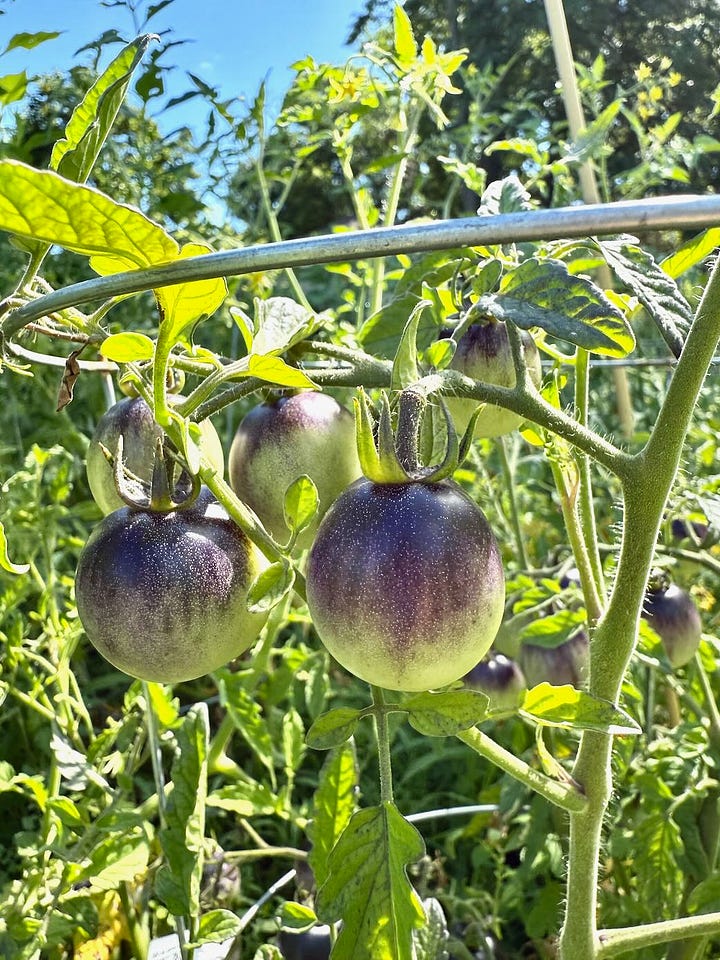
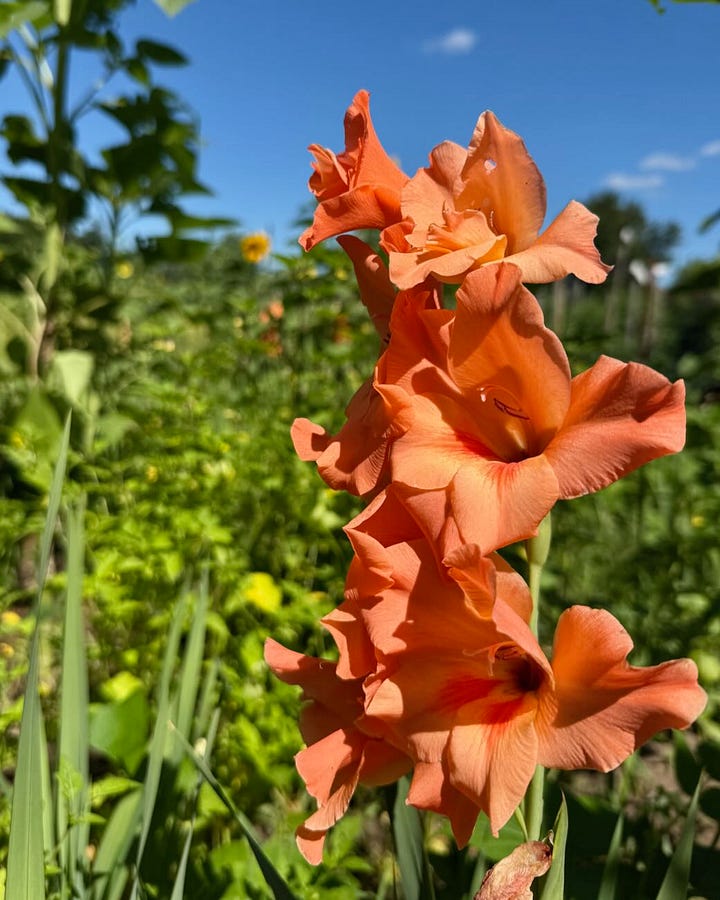
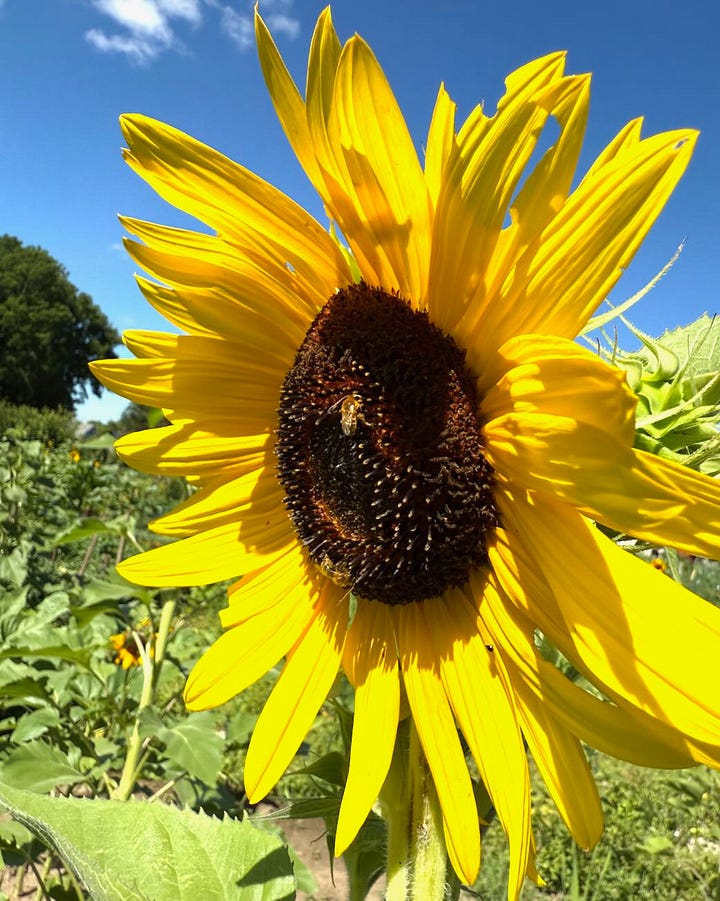
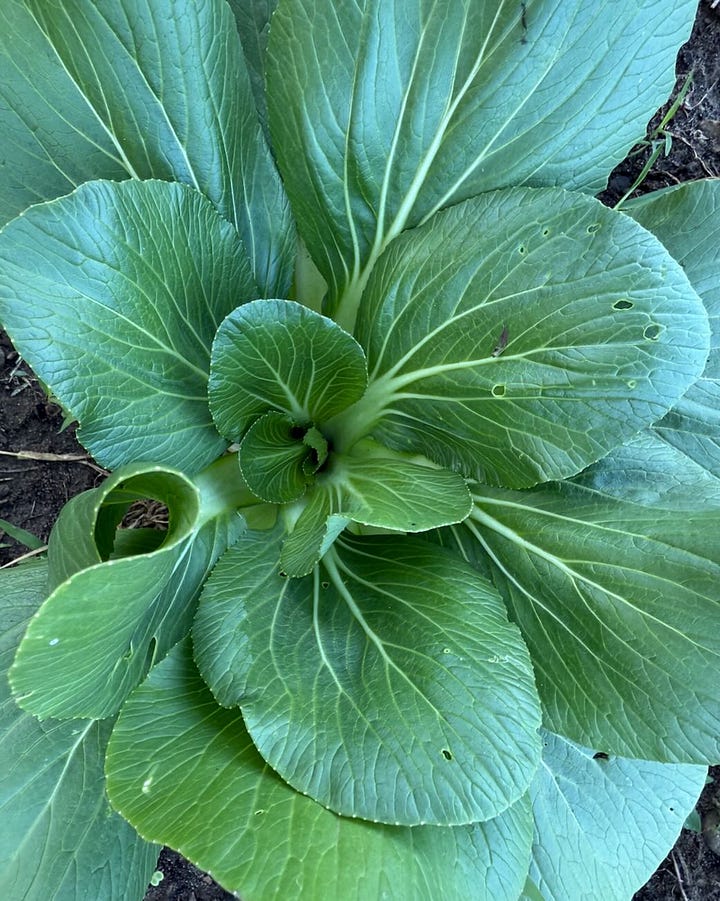
I might be short on words at the moment, but I do not lack for thoughtful, gifted friends. So this week, I’ve invited my friend Katherine Ellis to share some reflections on motherhood, memory, and the sorrows of the world.
Memory
Katherine Ellis
A personal vice: I detest appearing overly emotional. But I’m a new mom. Which means I am now often begrudgingly weepy.
A onesie now too small for my son’s three-month-old frame triggers a tear. I’m undone by a children’s book about a disheveled department-store bear. A schmaltzy YouTube ad selling shampoo makes me lachrymose. I can’t look away from a dead embryonic sparrow on the dirty sidewalk outside the neighborhood pub. I am overwhelmed by the horror of more than 50,000 children killed or injured in Gaza, as well as the countless others all over the world who might lose their lives because this presidential administration has slashed foreign aid. The pro-life party voted to decimate Medicaid, which covers more than 41 percent of births in America. Another body of a child is recovered after devastating flooding in my home state of Texas. These losses are not categorically commensurate. But all have brought me to tears.
Science is only just uncovering the extent to which motherhood changes the brain. In her book Mom Genes, Abigail Tucker describes a study of mothers who view pictures of different babies—angry, scared, happy. A different region of their prefrontal cortex lights up when compared to women who had never been pregnant. A study published last fall in the journal Nature Neuroscience found that during pregnancy, certain areas of the brain shrink; this shrinking, the study suggests, enables mothers to more efficiently bond with and respond to their babies’ needs. Other researchers have described motherhood’s neural impact as akin to going through puberty. The maternal brain is newly attuned and highly sensitive. (Fascinatingly, it’s unclear how much nature and nurture can be untangled; a 2022 study revealed that first-time fathers also experience significant, though smaller, neurological shifts attuning them to their child.) Nor is it all that discriminatory. While a mother can distinguish her baby’s cries from another, the sound of a stranger’s crying baby can also stimulate a let-down reflex, causing breastmilk to flow. She is newly aware of not only her child’s needs but also the needs and suffering of others.
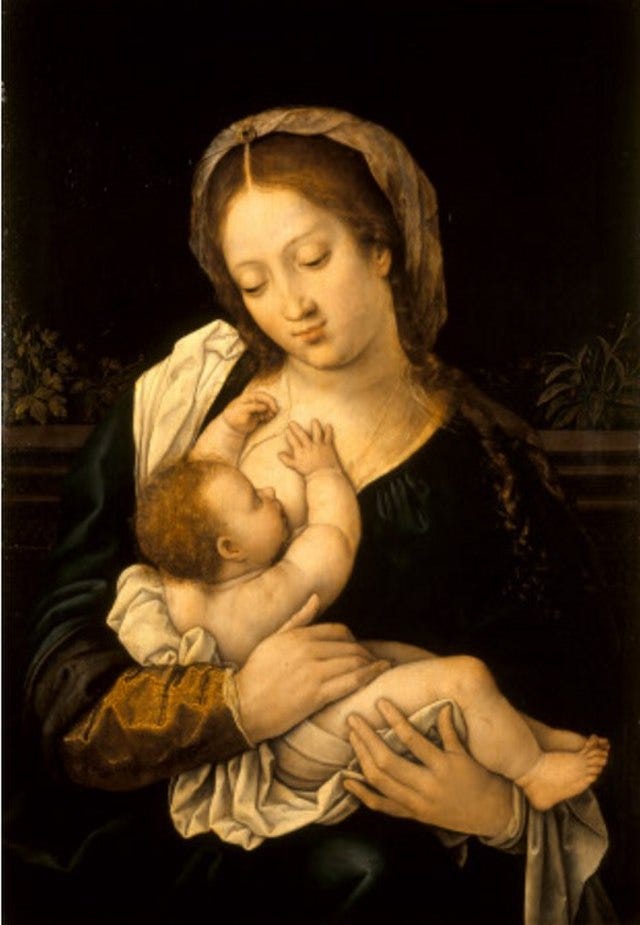
Becoming a mother has brought new meaning to the Pauline call to “weep with those who weep.” Parenthood is not an excuse to retreat from the world. Instead, I find myself uncomfortably chafed and chastened by the world’s capacity for joy and sorrow.
Last week I stumbled upon an Instagram post by a college friend. She described the terror of rocking her one- and three-year-olds in the pouring rain atop her grandmother’s roof. Her family yelled for help while the water rose. They had cut a hole in the house’s loft and swam to the roof, passing the babies from person to person. They were rescued. Too many were not.
I was breastfeeding my baby as I read my friend’s account. I cried, like so many others who have been moved by the stories that came out of the sodden Texas Hill Country. The missing eight-year-old camper with pigtails resembles your daughter, your neighbor. Images of bunk beds, overturned and caked in mud, elicit not just horror but also memories of the smell of sunscreen, the warmth of glowing embers, and the itchiness of welts. We imagine our own children, grandchildren, and community. We remember the capacious gifts of childhood and the delighted freedom of summer camp. We imagine. We remember. Or at least, we sometimes remember.
The other day, I came across a Texas Monthly article that described devastating floods in Central Texas: 1913, then 1921, and 1932, and 1987, and 1991, and 1997, and 1998. These floods have been largely forgotten and largely overlooked by most of the recent reporting. Though surely someone remembers them—someone, perhaps, who survived and picked through the debris—most of us do not. Yet despite our short memories—and even shorter attention spans—the land remembers. It carries the stories and the wounds of floods past.
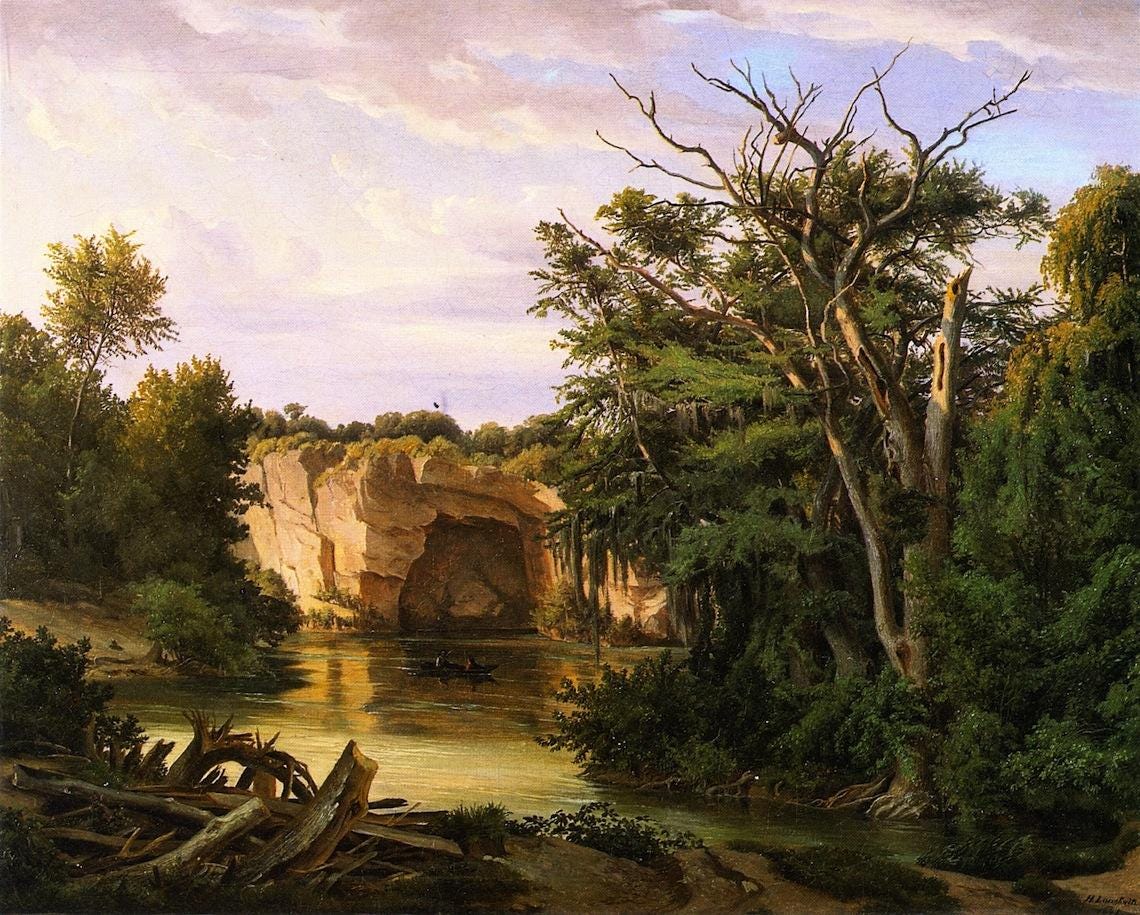
As my phone kept pinging with somber updates, I thought of Toni Morrison’s description of memory. For Morrison, memories haunt physical and mental spaces; they are the “remains” at an “archeological site.” She uses the image of a flood to describe the interplay between imagination, memory, and history:
The act of imagination is bound up with memory. You know they straightened out the Mississippi River in places, to make room for houses and livable acreage. Occasionally the river floods these places. ‘Floods’ is the word they use, but in fact it is not flooding; it is remembering. Remembering where it used to be.
Even if people have forgotten, the land, the place, remembers.
Born Chloe Wofford, Morrison was baptized in the Catholic Church at the age of twelve and took the name of Anthony of Padua, the patron saint of lost persons and items. She carried the saint’s name, shortened to Toni, throughout her career, and in her work, she bore his spirit. In her novels, remembering becomes a kind of borrowing from the past. She reimagines the interior lives of Black Americans, too often denied or forgotten. Remembering for Morrison is about being truthful rather than factual. She coins the term “rememory,” which she describes in her essay “The Site of Memory” as a “recollecting and remembering as in reassembling the members of the body, the family, the population of the past.” Given her namesake, it is fitting that Morrison spends her career reassembling what and who have been lost, forgotten, dis-membered.
Babies apparently have some early capacity for memory. My three-month-old son’s face explodes with a surprisingly toothy grin when I make silly faces or pedal his legs as I sing. His recognition of me is a form of remembering. But, of course, this form of memory is distinct from what we mean when we recall a Kesha song played at our high school prom or the name of our neighbor’s French bulldog. My son won’t remember being born. The beginning of life, like its end for so many, is conditioned by memory loss. Freud was the first to describe this lapse in our memory as infantile amnesia. We depend on others to carry the stories of our births and our deaths.
Some memories of my son’s nascent life are difficult, even for me, to remember. It’s not because my memory fails me. Instead, the images that come to mind are too vivid, too frightening. He’s three days old. An Ambu bag placed on his tiny body forces air back into his lungs. A doctor asks me to sign a medical-consent form authorizing a spinal tap. The crying subsides as a tiny tourniquet is removed from his bicep. The nurse swiftly detaches the needle from the vial of blood retrieved and says encouragingly, “He won’t remember this.” The incessant beep of machines and the pestering hum of fluorescent lights as my newly postpartum body, still bleeding, waddles to and from the bathroom in the PICU hallway.
These memories will remain with me.
The nurse was, of course, correct. Thankfully my son will have no recollection of the trauma of his first week of life. A neurologist and a neurosurgeon stop by our son’s room. An MRI had shown residue of bleeding in the brain. They ask me to recount my birth experience. They assure my husband and me that there is no real cause for concern. The ordeal of birth had caused some bleeding, but there is no abnormal brain activity: “If we took an MRI of all five-day old babies, many would reveal some history of bleeding.” All traces of the blood, we are told, will be absorbed in time.
Babies don’t realize until they are six, even nine months old that they are separate from their mothers. My son still does not know where he ends and I begin. Nor does he, for that matter, know that he “is.” My body, which once grew and housed his body, now not only nourishes his body but is still, in some sense, an extension of his body. Or is it that his body is an extension of mine?
In The Body Keeps the Score, the Dutch psychologist Bessel van der Kolk argues that trauma reshapes the body and brain. The body remembers even if the mind has forgotten. Where do memories linger when the blood is absorbed by the brain, or the river recedes, or the ceasefire holds?
Those memories, Morrison might suggest, are still present. Birth may be a separation, but my son only experiences the world through re-membering our bodies. I am learning from him. To be undone by the neediness of his body or the fragility of the world is to remember that our bodies and memories are, in fact, entangled. To be undone is to be moved—and perhaps to learn to weep without shame.
Katherine Ellis is a writer and a doctoral candidate in theology and ethics at Baylor University. She lives with her husband, her son, and their slightly unruly dog in New York City.
Thanks, as always, for reading. I’d love to know what Katherine’s essay stirred in you.
Holding onto hope and goodness with you. I’m so glad we can stumble through all this together, and I’ll try to write again soon.
All my best,
Jeff





alongside this remembering, our maternal bodies continue to "remember" because we absorb a bit of our child's DNA as they grow inside of us. Forever linked physically, and emotionally.
Oof. Such a relatable, timely essay. This matrescence has helped me understand Mother God so much more clearly. If I, a very average, ordinary mother, can be moved so deeply by my own precious ones cries and hurts, and then by extension, to the cries and hurts of the children (and their mothers!) literally everywhere, how much more must God feel the pain of their creation and be moved to action? I have found that deeply comforting in these tumultuous times...